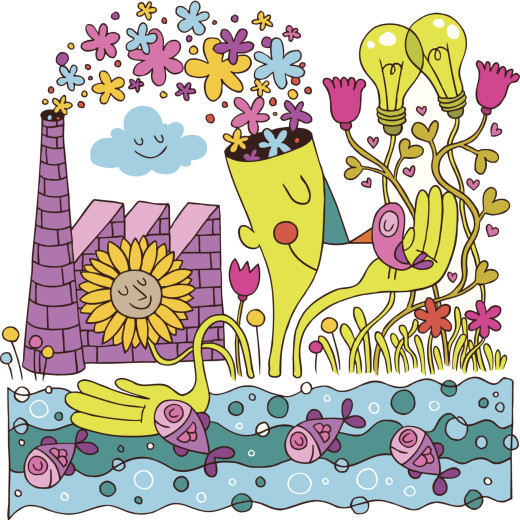— Keshav Chaturvedi
Whenever we talk of sustainability, we are reminded of one line definition articulated in the report “Our Common Future” presented by the United Nations’ World Commission on Environment and Development or more commonly the Brundtland Commission.
The definition says, “Sustainability is the ability to meet the needs of the present generation without compromising the ability of the future generations to meet their own needs.” The report has used three words sustainability, sustainable and sustainable development interchangeably. The report further states that the sustainability has three pillars – society, economy and environment. Humans are at the core of the problem as they live in the environment and perform economic activities.
When the economic activity leads to inclusive wealth creation that empowers the last person at the bottom of the pyramid within the society, the interaction between the economy and the society is considered equitable. Similarly, when the society’s economic actions are such that the environment gets the breathing space to regenerate then the relation between the society and the environment is bearable and the relation  between economy and environment is viable. When the economic equity, environment viability and social-environmental bear-ability coincide that moment is termed as sustainability.
between economy and environment is viable. When the economic equity, environment viability and social-environmental bear-ability coincide that moment is termed as sustainability.
However, sustainability as a concept is hard to achieve due to inherent contradictions within the UN framework that seeks to save the environment and tackle climate change. Reports like “Our Common Future” and the declaration during Stockholm Conference in 1972 both stress on the need to save environment but also make impassioned appeal for the right of the developing countries to pursue their economic development to bring millions out of poverty trap.
This twin demand is difficult to balance as it is always tough to measure the quantum of human impact on the environment. Yet the eco-systems have to be disturbed to achieve economic services for human survival. Clearing of land for agriculture is one such intervention. Mining is second and extraction of water for producing power and metals is another. No one knows what kind of long or short term irreversible impact on the environment can result while disturbing an eco-system for economic gains.
Meanwhile the Inter-governmental Panel on Climate Change (IPCC) insists that we should desist from “cautionary” principle. Cautionary principle means holding back any action in anticipation of better technology and greater as well as more convincing information. The IPCC says that the threat of climate change is so urgent that we can’t wait for any silver bullet technology or scientific data to take action. We should initiate actions to save eco-systems from degradation so that they emit less carbon dioxide and help mitigate climate change and are healthy and resilient enough to deal with the adverse impacts of climate change.
This has led to the emergence of concepts like “strong sustainability” and “weak sustainability”. The concept of “strong sustainability” professes that human and economic activity would be restricted or completely suspended in an environmental zone. While “weak sustainability” means economic and human activities is allowed in an environmental zone without any restriction.
While the “strong sustainability” paradigm has been understood by the governments and are generally respected (eg. protected or reserved forests, national parks, no-go zones etc), it is the “weak sustainability” paradigm that needs careful evaluation. Till now humans have given precedence to economy over environment. This has led to rampant over utilisation and wastage of resources.
The Millennium Environment Assessment undertaken between 2001-2005, by more than 1000 influential sustainability experts worldwide stated that 16 out of 24 eco-systems they studied were degraded. It means 60 percent of the eco-systems were badly in need of repair.
 It is true that civilization itself is anti nature. The day we started agriculture and living in settlements, we disturbed the natural rhythm. As we have progressed and the civilization has become more urban our impact on environment has increased. Together as a society the decisions we have taken in the last two centuries to exploit certain natural eco-systems has had a profound impact on environment.
It is true that civilization itself is anti nature. The day we started agriculture and living in settlements, we disturbed the natural rhythm. As we have progressed and the civilization has become more urban our impact on environment has increased. Together as a society the decisions we have taken in the last two centuries to exploit certain natural eco-systems has had a profound impact on environment.
It is true that to survive, humans will have to extract natural resources. Still it will help to remember the story of the “goose that laid the golden egg”. The pace of extraction of natural resources in the zone where we all practice “weak sustainability” can be managed, streamlined and made more efficient. Only then the lofty principle, enshrined in “Our Common Future”, of meeting our own needs without compromising the ability of the future generations to meet their own, will be achieved.
——
The author is a geography graduate and have been tracking the issue of climate change ever since the Rio Conference in 1992. He has also authored a book on the politics of climate change and was the content head of a renewable energy magazine – Energy Next. He blogs at — http://indiadynamic.wordpress.com/











Recent Comments